#he's so racist and misogynistic that he has such extreme reactions to her over nothing
Explore tagged Tumblr posts
Text
Ok so I thought I'd put together some horror stories from my time as a babymetal fan bc of how drastic the shift in the fandom has been the past year or so. For context I got into babymetal in like june of 2014 (all 3 girls were still underage at the time, I was 22; when I first got into them I thought I would be considered an older fan lmao the naivete, the innocence of new fan me wow I know now I'm not at all in the older half of the fandom esp considering I was born the same decade as su and moa), and I made this blog in I think may of 2015.
I've had people say I should compile men being gross into a post and I just couldn't do that out of fear for my own mental health but this will be pretty close. These are all my experiences with this fandom over the years; I'm definitely missing some but what I do remember should do well to cover most of how this fandom used to be vs now. It's gonna be a lot and tw for men being gross about minors.
Back in my first year or so of this blog I on multiple occasions got dms from men asking to be friends. At the time my bio only said my name and my pronouns. I've always been cautious of dms so I'd ask their age and every single one was considerably older than me. I wouldn't usually answer after that bc no thanks but they would generally try to continue convos til I blocked. The only one I still had was this one
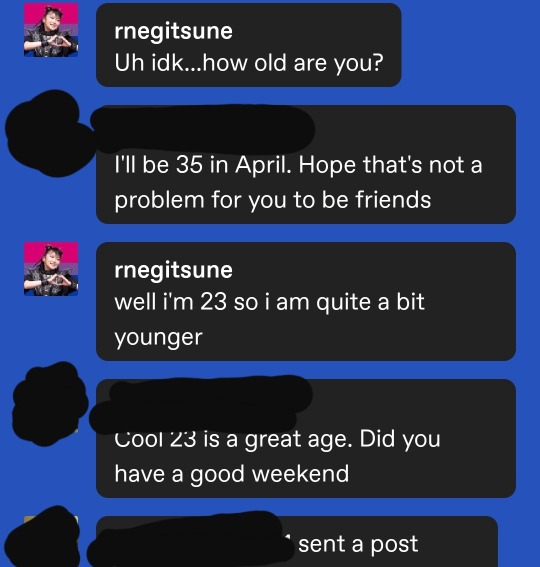
After I put my age in my bio, which was 23 at the time, I never got a dm like that again; take from that what you will. But if you're young please be wary of this hell fandom even now. And if you're an older fan and esp an older male fan reading this, don't dm people trying to be friends. I was over 18 and it still creeped me out to no end.
One of my real first men in this fandom are disgusting moments was a blog back in like 2015 or 2016 who I had some contact with due to common interests; he was a huge yui stan and made bm content. He was like 28 or 29 at the time and I eventually noticed he would tag idols, mostly kpop girls, by their body parts (legs, butt, etc) which is disgusting enough as it is but then I saw him do the same for literal minors, like tzuyu from twice. I messaged him asking what the hell he was doing objectifying women but also actual children and he blocked me lmao. He later unblocked me to let me know that's just how he tagged things and it was my fault he had anxiety and then he blocked me again.
Back before the tumblr purge this fandom was repulsive to a degree I cannot even begin to describe. Someone would reblog something from me, I'd go to their blog and it would be underage jpop idols and japanese p*rn all the way down. I even stumbled upon a man editing underage su into p*rn gifs. Obviously no proof of that but I did go find my initial reaction to it
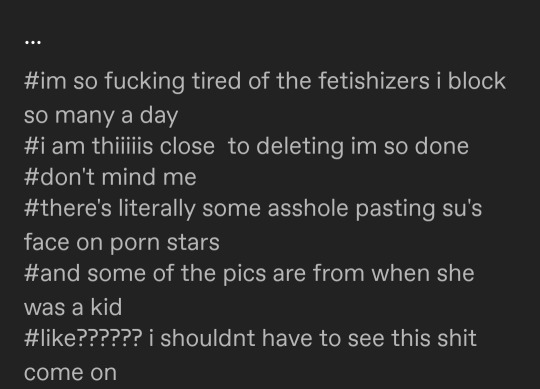
The number of times I'd get a follow from someone then go to their blog and it would be as mentioned above or their bio would be the most misogynistic trash I'd ever read was staggering. I genuinely considered giving up and deleting this blog so many times bc i felt oberwhelmed and outnumbered by these gross old dudes; and so the fact that this fandom has evolved into a bunch of chaotic wlw?? Amazing, I could cry.
Fun phenomenon of women running bm blogs was men sending messages asking if we liked babymetal. No joke. I think this happened to me two or three times but I spoke w other female creators at the time and it had happened to them as well. My entire blog is babymetal, and yet???
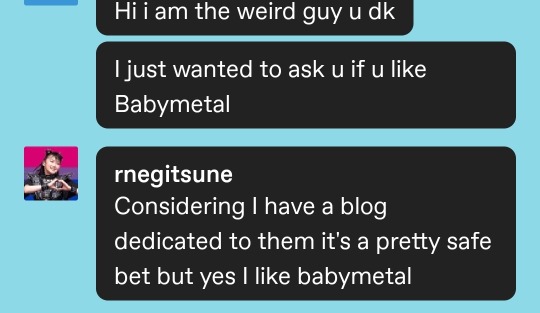
He said the weird guy idk bc he sent some random ass messages vaguely insulting me and when I responded coldly, he acted confused so I said you're some guy idk, hence the above message starting as such. Also that pic and the one up above that has my current pfp bc I just took those screenshots. Like I said I typically blocked weird dms but I guess these passed me by so I still had the messages.
Most people know the sub reddit is the worst and don't need me to tell you but it's a hellscape and I highly recommend avoiding it. A short list of things I've had to see as a result of going there: men discussing at length kano and momoko's appearances and how they look in costume vs in normal clothes. Men discussing at length the hope that the girls would marry men who aren't Japanese, a thread that was from when all 3 girls were underage. They aren't gonna marry you dude they're really not.
The insulting of billie Eilish, a 17 year old at the time, was horrible too. Su and moa got to meet her, something they were extremely excited for, and they posted a pic; the comments were disgusting as you can imagine. The yui rumors were terrible too, fatshaming, slutshaming etc all based on nothing. Some man saying the rumors about yui leaving bc, no joke this was a real rumor, she "got too fat" couldn't be true bc "look at saya." Saya being a barely 18 yo back up dancer who covered the third spot after yui left but before the avengers. Not to mention the upskirt shots from when they were minors, the constant editing of their faces onto explicit photoshoots etc. I remember being a new fan looking for a su pic on google and being horrified at the fact that one of the top suggested results after her name was “bikini;” she was 16 at the time. Also, the uptick in massively creepy posts and messages sent to bm blogs as each girl, but esp moa and yui, approached 18 was disgusting.
Now for some personal nonsense. A big reason why I haven't touched my youtube channel in months is bc I got tired of dealing with the men of this fandom. I poke fun at metal and get told I deserve to die. I say ped*philes and creepy men are gross and get a swarm of middle aged men cursing at me. Had a guy cry about how men are shamed for liking bm and then he turned around and said some gross shit about wlw. Had a guy call me racist for liking a band he also likes (and despite him having no way of knowing my own race) and tell me the babymetal fandom doesn't need my kpop feminist bullshit, which is honestly a great description and I thought about putting it in my yt about lmao. Had a middle aged man unironically say he'd never seen a man be creepy towards bm but fans su and moa's ages calling them hot was creepy. The disillusionment....the level of unawareness is astounding. If you want to see screenshots of some of these comments they are fairly recent in my don't mind me tag; I don't want to see them anymore tho bc they're infuriating so I'm not going to look at them to post here.
Essentially I haven't looked at my channel since may bc men are exhausting and rude and refuse to examine the fandoms they're a part of no matter what. They're told by a woman of the fandom that she's had bad experiences personally and they all start crying about how it's either a lie bc they haven't seen it or unimportant. I did stop reading comments in may and I will never read another one again probably as a result of this shit. Trash men being trash are not worth my time and I refuse to give them anymore of it. I do plan on making more videos tho and let my ~feminist kpop bullshit~ live in their minds rent free.
I will also continue to make fun of metal and the creepy men in this fandom bc it's important and I'm a spiteful asshole who likes disrupting these dudes perfect bubble of a fandom. It genuinely brings me so much joy seeing all the new fans recently (which sidenote if you got into them recently I am kinda curious as to how you found them; I've gotten tons of new followers and considering how inactive they are rn I'm curious). People sending messages about how they finally feel like they belong or that they have a safe space....like I don't even know what to say and I never feel like my responses fully convey how genuinely wonderful that is and how thrilled I am that this is where we're at now and I have had at least some part in it. As this post shows, my experiences have been negative for the most part so the shift recently is such a relief I cannot even begin to explain my gratitude.
So to anyone who read all of this and hasn't disintegrated from the male bullshit, thank you. Keep being yourself and fighting for your place in this fandom, esp if you're a young woman; keep making fun of the creeps and keep making wlw memes!! Babymetal's music is in such a huge way meant for girls and to see more and more finding their way to this previously hellish beyond belief fandom is incredible.
57 notes
·
View notes
Note
there's nothing wrong with making connections through other characters though? i swear the rpc is full of babies who just want their character to be special and loved and popular.
No nope nada we’re not doing this.
When you, as a person, look at a female character and want to plot that your two have a connection/know each other, not because you like HER but because she’s friends/related to/connected to/dating, a male character that you want to jump on. that’s just shitty.
and lets be real it is only really plotting a connection, y’all would never thread with the girl y’all are using to jump on some e-dick you like the look of. you don’t even properly read the dude’s bio lmao half the time you can’t even spell the dude’s name right.
Do you really want to get into this ok.
How many times have you done this to men? been like you know what I’m going to plot a connection here and then ignore them and their player just so I can get close to this female they’re dating/friends with? YEAH ZERO EXACTLY.
Female characters are only of use to the rpc when they serve a purpose of jump starting y’all with a male you like.
While we’re on that if y’all don’t stop ignoring trans men and women and aro/ace men and women and nb people too i will come out of your mirrors and choke you!
You all condemn female characters enough for things you praise men for.
You want examples? okay here’s two from RECENT personal experience. people can feel free to add on.
Sofie: (mexican lebanese - bisexual) bounty hunter has a wide range of contacts want ad for a found family type of deal she’s extremely perceptive personable,has a good humour, extremely loving to people she’s close to, family orientated, protective. other traits etc. snake mom. we’re a powers site (she has animal communication as a power) and she loves her two venomous snakes she calls her daughters more than anything, she’s protective of her, they are of her. human rights activist animal rights activist teaches self defence in her spare time. she’s happy, she’s confident, she loves herself.
Just from that brief description, you’d think she’d have an easy time plotting? she would if she was a man. I get four reactions to Sofie and y’all know whats coming.
1. straight up ignored / ”i’m not racist but her attitude makes me uncomfortable” 2. asked for threads just to “put her in her place/knock her down a few pegs.” (male rpers only reaction to her so far) 3. people just assume she’s easy and dtf any time and oversexualise tf out of her and it makes me extremely uncomfortable. 4. they use her to try to get to my best friends male character and ignore me any time i try to plot these “friends”.
Cassia: (white - bisexual) hacker she’s extremely smart, has a genius level iq she’s dealing with ptsd and anxiety shes in recovery for being an alcoholic from a traumatic experience she was abused when she was younger so she has low trust in men. preferring women’s company. she’s a genuinely nice person, she’s quiet, she shows her affection because she’s bad with words. she’s protective of her friends, she’s even more protective of other women. she uses her powers (electrokinesis) and her hacking skills to hack into databases and help women/people in danger in general. she’s so damn loving when you get to know her. has an adopted son she raised and kept alive when she was in captivity. she’s funny, not to toot my own horn but her reaction to stress is humour. like people start arguing and she peaces out through the window and scales the drain pipe. she ain’t here for it. Again, prime to be a good friend/more/easy-ish to plot with right? HAH y’all wanna know the reactions I get to Cass? I’ve posted a few horror stories before. but here’s some points.
1. she’s terrified of guns/authority figures. first thread with a person and he goes OFF on her about his right to carry and then taunts her with it. player then OOC calls her a bitch and stuck up because she wasn’t instantly all over him/she was cold to him. 2. people assume she’s a bitch so often with the only evidence being that she has anxiety and is quiet around new people. 3. people try to put her in threads with alcohol because they think it’ll be fun to test her self control. nobody really takes it serious because it’s not drugs. so people use it as a joke. 4. trying to thread with females is a pain in my ass, like she’s specifically geared as more towards threading with them. but people are not interested at all. 5. the misogynistic comments towards her past are usually made by women rpers. 6. on the addiction topic, someone didn’t like that she was being friends with the man said female rper wanted her char with so on purpose left out alcohol beside her and then the player joked about it OOC. 7. people trying to knock her down a few pegs also. 8. or they try to befriend her/plot connections with her just to get to the one of the two men she knows. never any of the females.
another point for both of them is that people keep treating them like absolute shit, as if that would somehow prove to the men these rpers are after that these girls are connected to. that they are better than cass or sofie. and I just sit here like ????? i don’t know about anyone else but if someone was literally being gross to me, to try to impress my brother or a friend i know they would drop them like a hot potato so I have no idea why people think that’s a good idea in the rpc.
Also I know my friend Alyx, has way more worse stories and shit of what people have done to her females, not jsut to try to get to my males but just for daring to exist so like. choke anon.
#Anonymous#Ask#rpt#rpc#rpa#rpcha#rp#i'm sure i forgot some really bad things but#the shit i've repressed is unreal#also i know this isn't as bad as what people who've been around longer#have endured
16 notes
·
View notes
Text
VNC Chapter 43 Analysis
Wow, for chapter designed to segue between one arc to the next, this one sure had a lot packed into it! The political intrigue is through the roof and our main characters take a backseat while we finally get to see Dominique and her family once more. Before that, though, a few last thoughts on Gévaudan. We learned both Chloé's and Jean-Jacques's names and they, indeed, suit them well. Chloé's was "Canorus," or "she who plays with snow crystals." She'd isolated herself in a snowy castle and she played the piano to exert her power, which has white keys. It also implies a more lighthearted nature to Chloé than we really got to see, which seems accurate to me. Jean-Jacques's is "Aprix" or "he who nestles close to the last snows." His is especially overt in its meaning: he loves the snow (Chloé) and stays close to her side. Jean-Jacques is also the easiest vampire to cure we've seen to date and the reason is simple: he only gave his name to Naenia to protect Chloé. If he doesn't need to do so to protect her, then why bother?
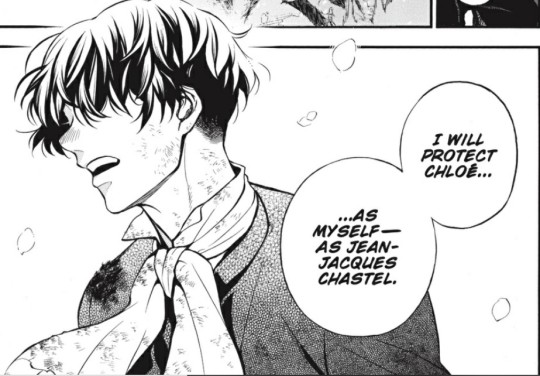
He will now protect her as himself, his true self, without any outside help. I can't help but wonder how soon he will have to live up to that promise. We also finally get something of an update on Johann and Dante.

Okay, so we already knew these two were hired by Marquis Machina, we just didn't know what it was they were looking for. Turns out, the whole reason they were there was for Chloé's alteration device. This actually makes perfect sense: it contains information and that's precisely what dhampirs collect. Furthermore, it seems information is what Marquis Machina is most interested in as well, so things are adding up nicely.
Unfortunately, (or thankfully?) Marquis Machina doesn't get whatever information this device has because of the chasseurs and Ruthven. I think it's safe to say at this point that there are certain members of the Church that are allied with Ruthven. Furthermore, they are almost certainly trying to reignite a war between humans and vampires.
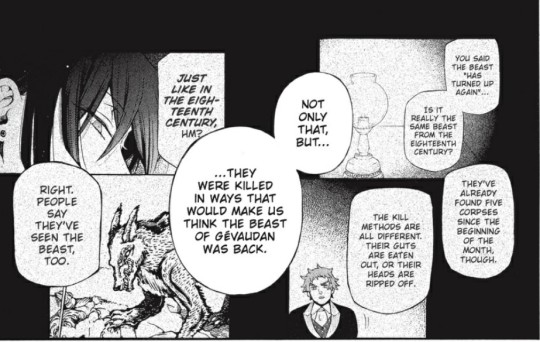
Having these two groups working together is nothing short of a disaster because it's a very effective team up and no one even suspects what's going on, save for possibly Marquis Machina who is familiar with both Ruthven and Chloé, but I'll talk a bit more about that in a bit. Also, I think we now know why Astolfo was sent to Gévaudan:
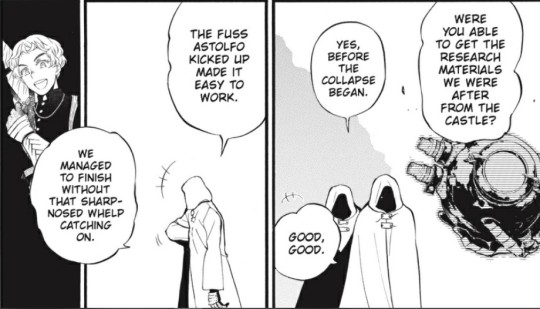
Now this is just sinister. Astolfo was purposefully sent because they know he has no restraint. They know he's angry, looking for purpose, and they're manipulating those emotions into something beneficial for them. It also means they know Roland is questioning the Church; they had to make sure he was sufficiently distracted in order to get what they came for. And who was in charge of all this? None other than Gano, the mysterious chasseur that was supposed to come as backup a couple chapters ago. I guess now we know what the holdup was about.
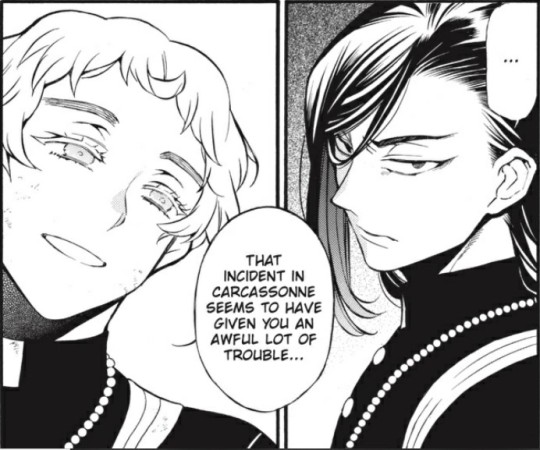
There is not a lot of love lost here, is there? Olivier is looking at Gano with overt mistrust and disdain. Roland has his relaxed grin firmly in place, but I think we know enough about him at this point not to blindly believe it: he knows there's something up with Gano and he knows that whatever happened in Carcassonne shouldn't have taken that long. I think we now have a physical representation of why Olivier is so worried about Roland's behavior. He knows people like Gano are aware of his treasonous thoughts and he knows Roland is in danger. I think it's also safe to say that Olivier isn't a big fan of a lot of people in the Church, which fits in with the leeway he's given Roland and his extreme opinions (in the Church's eyes at least). As for this Gano...
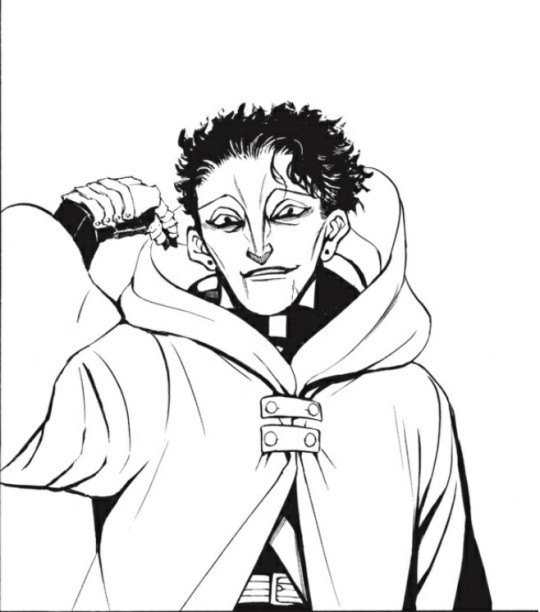
That is one of the most suspicious individuals I've ever seen. 8D My goodness, Mochizuki isn't doing much to give him the benefit of the doubt, is she? XD He's all but leering at them; he knows something they don't. No wonder Olivier looks so irritated. I wouldn't be surprised if Gano is an extremely powerful chasseur. All the more reason for Roland to be careful in his investigation of things. Another major thing before we jump into the de Sade drama:
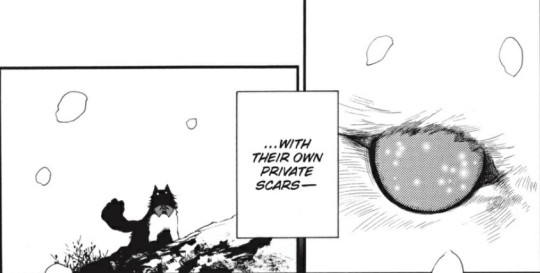
I KNEW IT. I KNEW IT, BUT I CAN'T BELIEVE IT, I-- *ahem* So, Murr is a shady cat. :D Either Teacher is the cat or, more likely, he's watching everything through the cat, which is still pretty disturbing. Think about it: Noé has been put through the wringer repeatedly, and Teacher hasn't lifted a finger to help him. Noé was nearly killed by Ruthven on two separate occasions, nearly died in the catacombs, lost a limb most recently, and I'm sure it's only going to get worse. The only time Teacher offered any help was when Noé was asleep and even then he wasn't so much helping as he was listening to Noé's troubles, no doubt because he was curious what Noé would do. It's Louis all over again, just with some adjustments for Noé's personality. Anyway, that wraps up the Gévaudan arc pretty neatly. I doubt this is the last we'll see of Chloé and Jean-Jacques, though. You don't spend this much time developing two characters simply to drop them by the wayside for the next arc. I have two guesses on how this could go: Chloé and Jean-Jacques will show up later in the series to support Noé or to offer some knowledge on Ruthven. Alternatively, they will be sacrificed in the near future to prevent that information from getting out. Either way, for the moment, Vanitas and Noé are allowed to bask in their victory and feel as if they've accomplished something, which they have, but there is so much manipulation in this series I'm feeling uncertain about how long they'll get to enjoy it. And at long last, we get to see Dominique again! None of our questions about Misha are answered, though, and if anything, I'm more worried about what happened to her than ever. She thinks all of that was a dream? What did he do to her?
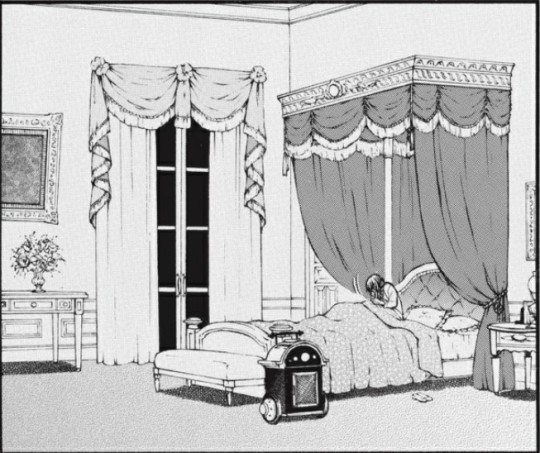
Everything seems to be in order. Her bedroom is clean, there's no sign of struggle, she isn't missing anything... It makes everything that much more alarming. How long has she been sleeping? What happened after she met Misha? Quite a bit of time has passed, so that seems to indicate, to me, that if she's still dreaming about Misha, something bad happened that she can't remember. There seem to be a lot of memory issues in this series. After all, if you can't remember something, you can't very well exercise your will over a situation, can you? Dominique is desperate to get outside, but she's immediately confronted by her sister, Veronica.
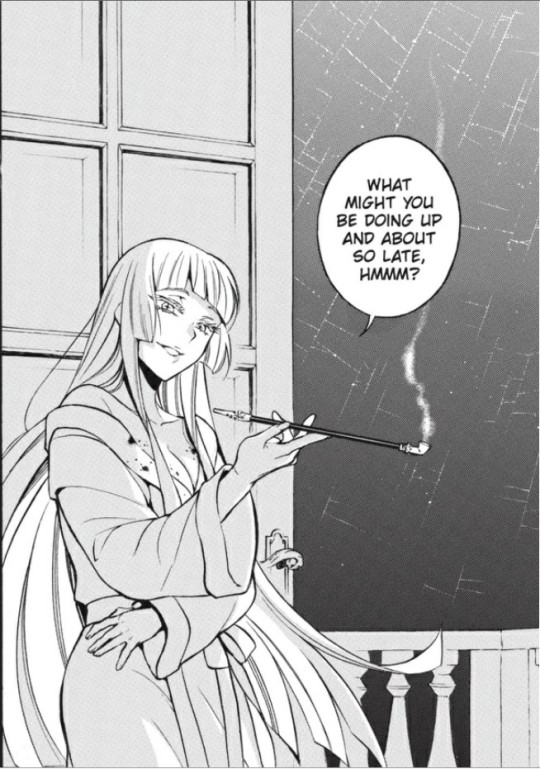
There's a familiarity between these two that shows they were probably raised together, but there isn't any closeness, which means they weren't raised to have especially strong bonds with one another. It's an interesting dynamic and feels both sinister and aristocratic. Now, Veronica says she's covered in blood because she was having an intimate moment with Marquis Machina. However, I feel the need to point out, there's no reason we should believe her. We didn't see the marquis anywhere, after all. However, she has information on the senate meeting that she could only have gotten from someone in the senate, so there's probably some truth to what she's saying. Personally, I find this a curious change of attitude for Veronica. I thought she was a bit of a misandrist if I'm completely honest. This is the woman who said, "What is a human doing here? Not only that, but a man. What a stench. The stink of humans is so strong I think my nose may drop off." I suppose her biggest issue was that he was a human (so, she's a xenophobe and/or racist), but his being a man didn't seem to help. Still, people who are bigoted often get together with the very people they have issues with. In that regard, Veronica and Vanitas are kind of similar. 8D Vanitas definitely has misogynistic tendencies and he's trying to have a relationship with a woman. Likewise, Veronica may have issues with men, but she's having a fling with one. All right, then. It is true that she and the marquis interacted with one another in volume two:
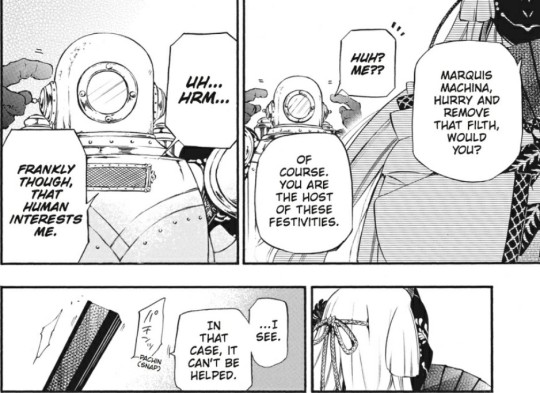
It's extremely subtle, but the fact she didn't just go ballistic on the marquis when he didn't handle the problem could indicate a certain fondness for the guy. Anyway, the important bit for now is Dominique's reaction to this revelation: she seems a whole lot like Noé all of a sudden. Dominique: Marquis Machina got you all bloody, Veronica? Why...? This is kind of odd for Dominique. She normally seems way more worldly than this, not to mention way more on top of things. This seems more like the Dominique we saw in flashbacks, and I suppose that makes sense. She just woke from a nightmare, she's feeling disoriented, and her sister is messing with her. Not a great time of things. Furthermore, her sister says this:
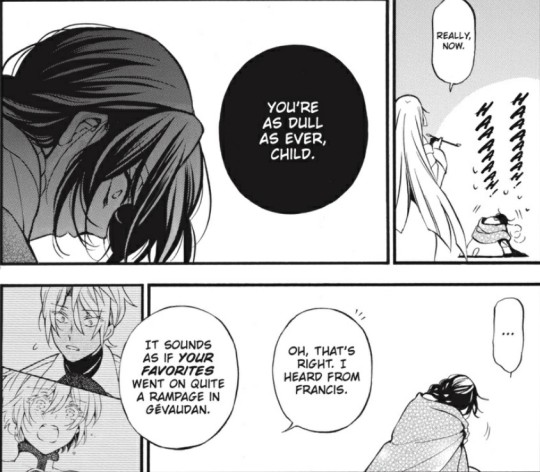
"You're as dull as ever, child." This is in direct reference to Dominique being uncomfortable hearing about Veronica's sexual conquests. This strongly implies Dominique isn't having her own sexual conquests, despite her being so flirtatious in previous chapters. Put that together with Veronica referring to Noé and Jeanne as Dominique's "favorites" and I think it's safe to say that at the moment, Dominique is harboring unrequited romantic feelings for both of these individuals and Veronica find the whole thing contemptible. As an aside, this means Dominique and Vanitas are kind of similar, too. 8D In fact, both of them are having more luck with Jeanne than they are with Noé. Jeanne seemed quite taken with Dominique and their dance going so far as to keep pursuing her afterwards, and she has become much more fond of Vanitas. Meanwhile, Vanitas's almost-pursuit of Noé at the beginning of the series* has gotten exactly nowhere, much like Dominique's. I'm not sure what that says, exactly, except that Jeanne might be more romantically inclined than Noé. Or, perhaps, Noé is even more oblivious than Jeanne to this stuff. Still, both Vanitas and Dominique are very close to Noé, so maybe it's a matter of time. Anyway, we then get into the political spectrum of things, and this is no doubt what a lot of the next arc will be dealing with. We're introduced to several senate members, and none of them seem trustworthy.
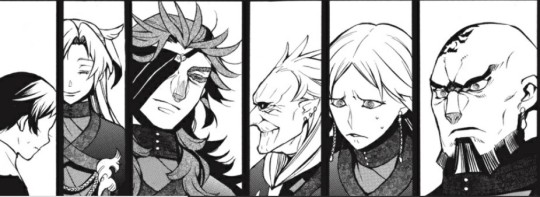
From right-to-left we have: Lord Bellator (the Fuming), Unnamed Lord (the Nervous), Lord Paldence (the Sly), Lord Ruthven (the Liar), Antoine (probably a lord? I'll call him "the Diplomat" and in this instance that's not necessarily a good thing), and Master Luca (heir to the throne AKA "the Prince"). I think it's interesting that in the overhead shot, we're shown there are eight senate members, but in this closeup we're only shown five, not counting Luca. We know Marquis Machina was there (though notably his face wasn't shown), that raises the number to six. That means there were two members there we still know nothing about, not to mention The Nervous, who was never given a name. It seems Bellator and Ruthven are not each other's biggest fans. In fact, most of the meeting that we are shown is of these two going at each other's throats.
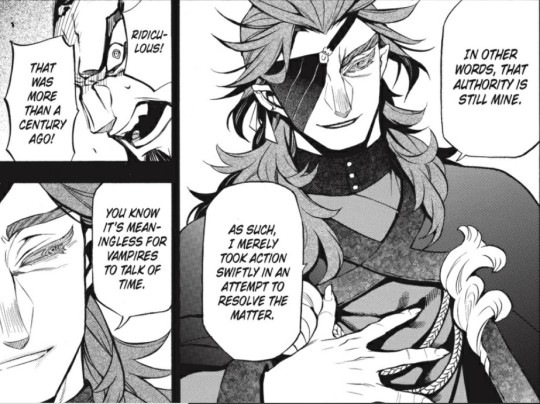
Ruthven's comment here makes it pretty obvious that vampires live for a ridiculously long amount of time, but even vampires agree that acting like you can do whatever you want because of a conversation from a century ago is kind of pushing it. It also implies that the people on the senate have been on the senate for a ridiculously long amount of time. In other words, they are set in their ways; there's been no new fresh blood. The political side to vampiric society is probably insanely outdated compared to humanity's and that's saying something for a series taking place in the 19th century--it's not just that certain families stay in power for years and years; literally the exact same people maintain that power. No change. No advances. They are stuck. Anyway. Dominique doesn't want Jeanne to be executed, understandably, and she reveals this weakness to Veronica.
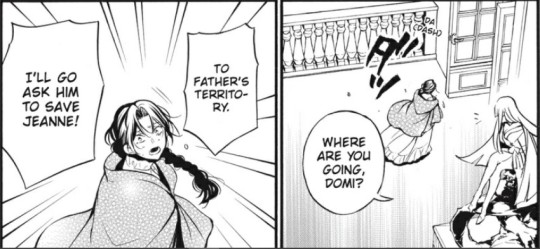
Veronica berates her for trying to drag the family name through the mud; apparently, no one likes a bourreau. But what I find interesting is that Dominique says "Father's territory." Um... what? So, they live in this giant mansion and the father has his own territory? What about the mother? Do they mean territory as in he invaded and took over some spot or do they mean he just really needs his space? Either way, this is further evidence that this family is not very close; they are some kind of political enterprise. I really feel bad for Dominique, though. She's kind of out of it, but she immediately goes to Jeanne's rescue. Gotta admire that. Anyway, Antoine finally shows up and all of that is taken care of.
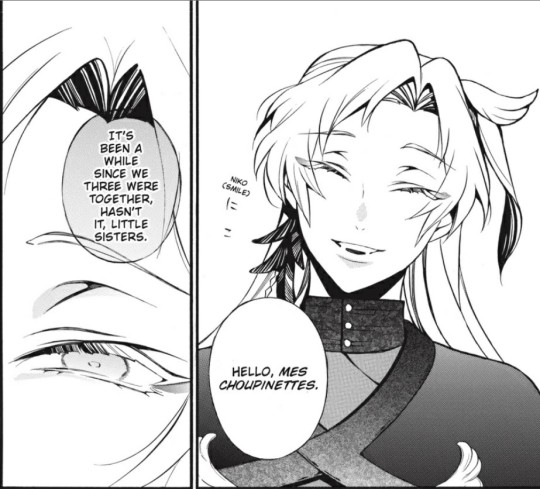
Antoine's sudden appearance is jarring, to say the least. Also, his fangs are out. Now, who was hanging out in the hallway with blood on her? Veronica. Who just showed up with his fangs bared? Antoine. Who seems incredibly shady? Both of them. There's probably nothing to this, but if there's going to be some kind of bizarre, incestuous affair going on, I wouldn't be shocked to discover it was with the de Sades. Regardless of potential crack theories, Antoine gives us even more information on what happened at the senate meeting. This makes it pretty clear to me that Antoine is kind of the head of the house. Why didn't their father go? Apparently because he has an entire territory to himself, I don't know. Thus, the responsibility falls to Antoine. Luckily for the de Sade family, he seems remarkably good at this job. He easily maneuvered Bellator into doing what he wanted and got the senate to cool down as well.
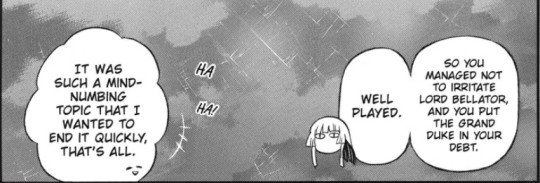
Even Veronica is impressed. He says he just wanted to move on from the topic, and I almost believe him, but there's no doubt he benefited from the whole thing as well. But he continues on, and it raises some questions.
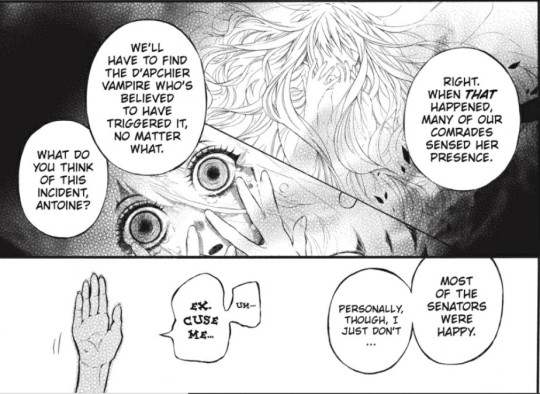
What does he mean by "comrades?" It could be the other senate members, but Dominique thinks she shouldn't be hearing about this, which she didn't say previously. It makes me think that the de Sades are involved in something a little more nefarious than mere politics. If they're aligned with Ruthven, then I suppose it's the Church and they want a war. If not, then I have no idea; there are quite a few possibilities there. Perhaps loyalists to the queen? Either way, he isn't sure the queen's reappearance is a good thing, understandably, too. It would change the power dynamics for certain. We then get to see Marquis Machina speak with Ruthven, and, boy, are there some layers in that conversation.
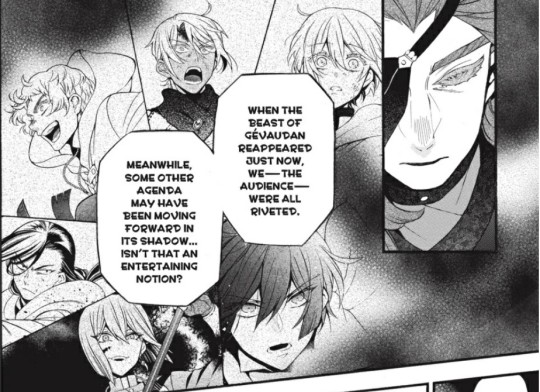
In other words, Machina knows something was afoot, and he's letting Ruthven know he knows he had something to do with it. It also means that literally every single person involved in the Gévaudan incident was a pawn.
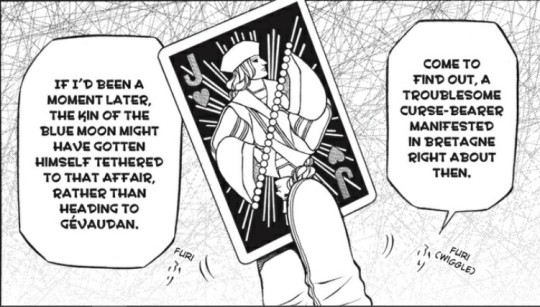
Ahh, now this raises the question: who is the chess master? At first, it's easy to think it's Ruthven. But now we see that Machina was manipulating quite a few things: the dhampirs, Noé, and Vanitas. A section of the chasseurs were squarely in Ruthven's control, however, so what we're seeing here is a power struggle between Ruthven and Machina. Who knows which of them will win that particular battle? For the moment, Ruthven is ahead simply because he got the device from Gévaudan, but who knows how long he'll be able to keep the edge.
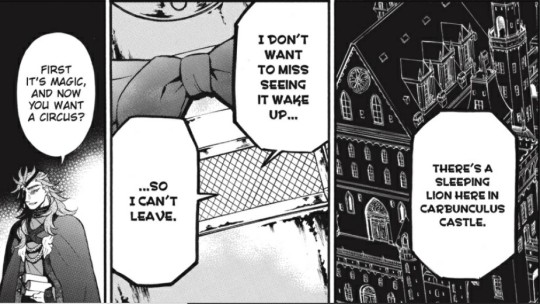
I'm almost certain Machina is referring to Ruthven here. He's certainly been causing a lot of trouble in secret. On the other hand, "lion" has noble associations, so it could be Luca's rise to power. He beared his fangs at this meeting and saved Jeanne. Perhaps Machina is curious to see whether he can maintain the throne. Ruthven is still the more likely choice judging by the panel that follows:
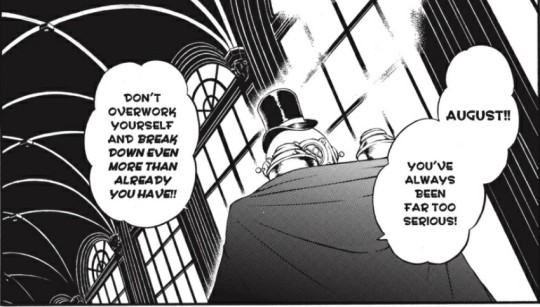
Machina knows Ruthven is teetering on the edge, and he wants to see the man fall. This next arc is going to be something. There are so many threads in this introductory chapter alone that I think it's safe to say we're in for a wild ride. After all that, we get a brief glimpse of Noé and Vanitas back at the hotel.

We have a bit of a time skip; they've been back in Paris for ten days, and Noé is only now growing concerned that Vanitas has been sleeping solidly for all of them. Um, Noé, you probably should have checked after the first day.... We can also see that Noé is wearing a brace and that it looks like they're trying to reattach his hand. I am ... so curious about whether that works. Just let me know, Mochizuki, please.... Noé also gets to see Vanitas's sleeping face at long last! XD

What even, Vanitas. XD I can't tell if he's actually sick or if he's completely drained from how emotionally vulnerable he was for the entire Gévaudan arc. He was literally worrying about Noé for the entire arc, then he was worrying about his promise to Jeanne, then he was panicking about how fond Jeanne was of him suddenly and his own reaction to it. Yeah, I don't think he was prepared for literally anything in that arc. XD Guess we'll see how that continues later this month! I really need to see it.... *I've talked about that in previous installments, so I opted not to bog things down further by getting into it here, but if it seems unclear feel free to ask about it. :)
74 notes
·
View notes
Text
Against the Logic of the Guillotine: Why the Paris Commune Burned the Guillotine—and We Should Too
148 years ago this week, on April 6, 1871, armed participants in the revolutionary Paris Commune seized the guillotine that was stored near the prison in Paris. They brought it to the foot of the statue of Voltaire, where they smashed it into pieces and burned it in a bonfire, to the applause of an immense crowd.1 This was a popular action arising from the grassroots, not a spectacle coordinated by politicians. At the time, the Commune controlled Paris, which was still inhabited by people of all classes; the French and Prussian armies surrounded the city and were preparing to invade it in order to impose the conservative Republican government of Adolphe Thiers. In these conditions, burning the guillotine was a brave gesture repudiating the Reign of Terror and the idea that positive social change can be achieved by slaughtering people.
“What?” you say, in shock, “The Communards burned the guillotine? Why on earth would they do that? I thought the guillotine was a symbol of liberation!”
Why indeed? If the guillotine is not a symbol of liberation, then why has it become such a standard motif for the radical left over the past few years? Why is the internet replete with guillotine memes? Why does The Coup sing “We got the guillotine, you better run”? The most popular socialist periodical is named Jacobin, after the original proponents of the guillotine. Surely this can’t all be just an ironic sendup of lingering right-wing anxieties about the original French Revolution.
The guillotine has come to occupy our collective imagination. In a time when the rifts in our society are widening towards civil war, it represents uncompromising bloody revenge.
Those who take their own powerlessness for granted assume that they can promote gruesome revenge fantasies without consequences. But if we are serious about changing the world, we owe it to ourselves to make sure that our proposals are not equally gruesome.

A poster in Seattle, Washington. The quotation is from Karl Marx.
Vengeance
It’s not surprising that people want bloody revenge today. Capitalist profiteering is rapidly rendering the planet uninhabitable. US Border Patrol is kidnapping, drugging, and imprisoning children. Individual acts of racist and misogynist violence occur regularly. For many people, daily life is increasingly humiliating and disempowering.
Those who don’t desire revenge because they are not compassionate enough to be outraged about injustice or because they are simply not paying attention deserve no credit for this. There is less virtue in apathy than in the worst excesses of vengefulness.
Do I want to take revenge on the police officers who murder people with impunity, on the billionaires who cash in on exploitation and gentrification, on the bigots who harass and dox people? Yes, of course I do. They have killed people I knew; they are trying to destroy everything I love. When I think about the harm that they are causing, I feel ready to break their bones, to kill them with my bare hands.
But that desire is distinct from my politics. I can want something without having to reverse-engineer a political justification for it. I can want something and choose not to pursue it, if I want something else even more—in this case, an anarchist revolution that is not based in revenge. I don’t judge other people for wanting revenge, especially if they have been through worse than I have. But I also don’t confuse that desire with a proposal for liberation.
If the sort of bloodlust I describe scares you, or if it simply seems unseemly, then you absolutely have no business joking about other people carrying out industrialized murder on your behalf.
For this is what distinguishes the fantasy of the guillotine: it is all about efficiency and distance. Those who fetishize the guillotine don’t want to kill people with their bare hands; they aren’t prepared to rend anyone’s flesh with their teeth. They want their revenge automated and carried out for them. They are like the consumers who blithely eat Chicken McNuggets but could never personally butcher a cow or cut down a rainforest. They prefer for bloodshed to take place in an orderly manner, with all the paperwork filled out properly, according to the example set by the Jacobins and the Bolsheviks in imitation of the impersonal functioning of the capitalist state.
And one more thing: they don’t want to have to take responsibility for it. They prefer to express their fantasy ironically, retaining plausible deniability. Yet anyone who has ever participated actively in social upheaval knows how narrow the line can be between fantasy and reality. Let’s look at the “revolutionary” role the guillotine has played in the past.
“But revenge is unworthy of an anarchist! The dawn, our dawn, claims no quarrels, no crimes, no lies; it affirms life, love, knowledge; we work to hasten that day.”
-Kurt Gustav Wilckens—anarchist, pacifist, and assassin of Colonel Héctor Varela, the Argentine official who had overseen the slaughter of approximately 1500 striking workers in Patagonia.
A Very Brief History of the Guillotine
The guillotine is associated with radical politics because it was used in the original French Revolution to behead monarch Louis XVI on January 21, 1793, several months after his arrest. But once you open the Pandora’s box of exterminatory force, it’s difficult to close it again.
Having gotten started using the guillotine as an instrument of social change, Maximilien de Robespierre, sometime President of the Jacobin Club, continued employing it to consolidate power for his faction of the Republican government. As is customary for demagogues, Robespierre, Georges Danton, and other radicals availed themselves of the assistance of the sans-culottes, the angry poor, to oust the more moderate faction, the Girondists, in June 1793. (The Girondists, too, were Jacobins; if you love a Jacobin, the best thing you can do for him is to prevent his party from coming to power, since he is certain to be next up against the wall after you.) After guillotining the Girondists en masse, Robespierre set about consolidating power at the expense of Danton, the sans-culottes, and everyone else.
“The revolutionary government has nothing in common with anarchy. On the contrary, its goal is to suppress it in order to ensure and solidify the reign of law.”
-Maximilien Robespierre, distinguishing his autocratic government from the more radical grassroots movements that helped to create the French Revolution.2
By early 1794, Robespierre and his allies had sent a great number of people at least as radical as themselves to the guillotine, including Anaxagoras Chaumette and the so-called Enragés, Jacques Hébert and the so-called Hébertists, proto-feminist and abolitionist Olympe de Gouges, Camille Desmoulins (who had had the gall to suggest to his childhood friend Robespierre that “love is stronger and more lasting than fear”)—and Desmoulins’s wife, for good measure, despite her sister having been Robespierre’s fiancée. They also arranged for the guillotining of Georges Danton and Danton’s supporters, alongside various other former allies. To celebrate all this bloodletting, Robespierre organized the Festival of the Supreme Being, a mandatory public ceremony inaugurating an invented state religion.3
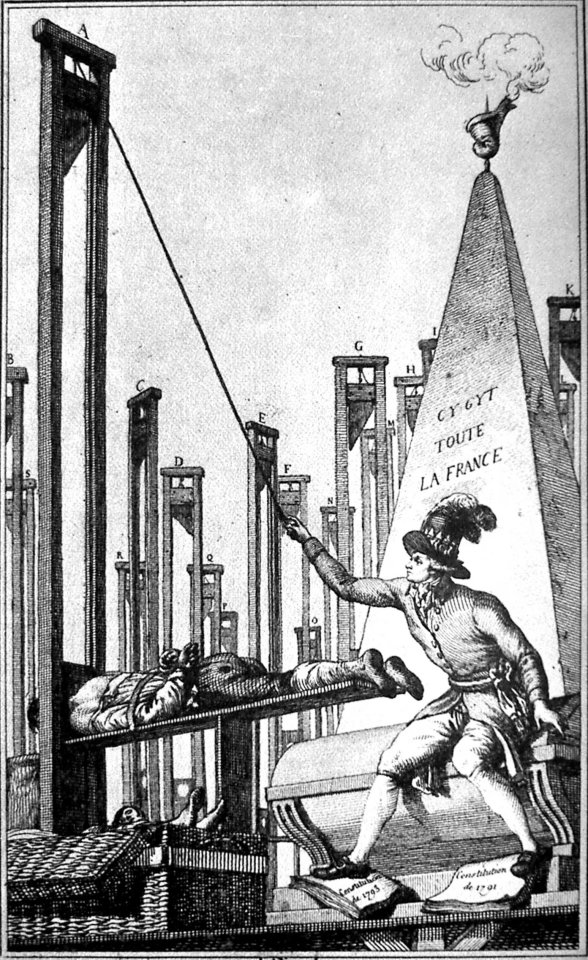
“Here lies all of France,” reads the inscription on the tomb behind Robespierre in this political cartoon referencing all the executions he helped arrange.
After this, it was only a month and a half before Robespierre himself was guillotined, having exterminated too many of those who might have fought beside him against the counterrevolution. This set the stage for a period of reaction that culminated with Napoleon Bonaparte seizing power and crowning himself Emperor. According to the French Republican Calendar (an innovation that did not catch on, but was briefly reintroduced during the Paris Commune), Robespierre’s execution took place during the month of Thermidor. Consequently, the name Thermidor is forever associated with the onset of the counterrevolution.
“Robespierre killed the Revolution in three blows: the execution of Hébert, the execution of Danton, the Cult of the Supreme Being… The victory of Robespierre, far from saving it, would have meant only a more profound and irreparable fall.”
-Louis-Auguste Blanqui, himself hardly an opponent of authoritarian violence.
But it is a mistake to focus on Robespierre. Robespierre himself was not a superhuman tyrant. At best, he was a zealous apparatchik who filled a role that countless revolutionaries were vying for, a role that another man would have played if he had not. The issue was systemic—the competition for centralized dictatorial power—not a matter of individual wrongdoing.
The tragedy of 1793-1795 confirms that whatever tool you use to bring about a revolution will surely be used against you. But the problem is not just the tool, it’s the logic behind it. Rather than demonizing Robespierre—or Lenin, Stalin, or Pol Pot—we have to examine the logic of the guillotine.
To a certain extent, we can understand why Robespierre and his contemporaries ended up relying on mass murder as a political tool. They were threatened by foreign invasion, internal conspiracies, and counterrevolutionary uprisings; they were making decisions in an extremely high-stress environment. But if it is possible to understand how they came to embrace the guillotine, it is impossible to argue that all the killings were necessary to secure their position. Their own executions refute that argument eloquently enough.
Likewise, it is wrong to imagine that the guillotine was employed chiefly against the ruling class, even at the height of Jacobin rule. Being consummate bureaucrats, the Jacobins kept detailed records. Between June 1793 and the end of July 1794, 16,594 people were officially sentenced to death in France, including 2639 people in Paris. Of the formal death sentences passed under the Terror, only 8 percent were doled out to aristocrats and 6 percent to members of the clergy; the rest were divided between the middle class and the poor, with the vast majority of the victims coming from the lower classes.
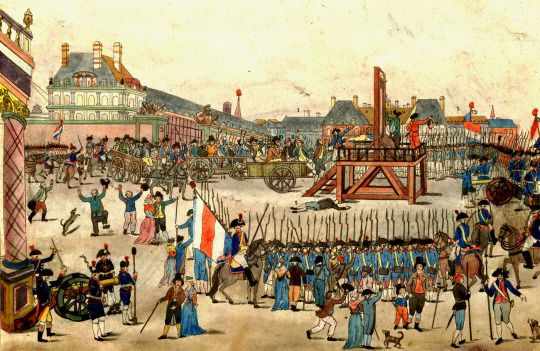
The execution of Robespierre and his colleagues. Robespierre is identified by the number 10; sitting in the cart, he holds a handkerchief to his mouth, having been shot in the jaw during his capture.
The story that played out in the first French revolution was not a fluke. Half a century later, the French Revolution of 1848 followed a similar trajectory. In February, a revolution led by angry poor people gave Republican politicians state power; in June, when life under the new government turned out to be little better than life under the king, the people of Paris revolted once again and the politicians ordered the army to massacre them in the name of the revolution. This set the stage for the nephew of the original Napoleon to win the presidential election of December 1848, promising to “restore order.” Three years later, having exiled all the Republican politicians, Napoleon III abolished the Republic and crowned himself Emperor—prompting Marx’s famous quip that history repeats itself, “the first time as tragedy, the second time as farce.”
Likewise, after the French revolution of 1870 put Adolphe Thiers in power, he ruthlessly butchered the Paris Commune, but this only paved the way for even more reactionary politicians to supplant him in 1873. In all three of these cases, we see how revolutionaries who are intent on wielding state power must embrace the logic of the guillotine to acquire it, and then, having brutally crushed other revolutionaries in hopes of consolidating control, are inevitably defeated by more reactionary forces.
In the 20th century, Lenin described Robespierre as a Bolshevik avant la lettre, affirming the Terror as an antecedent of the Bolshevik project. He was not the only person to draw that comparison.
“We’ll be our own Thermidor,” Bolshevik apologist Victor Serge recalls Lenin proclaiming as he prepared to butcher the rebels of Kronstadt. In other words, having crushed the anarchists and everyone else to the left of them, the Bolsheviks would survive the reaction by becoming the counterrevolution themselves. They had already reintroduced fixed hierarchies into the Red Army in order to recruit former Tsarist officers to join it; alongside their victory over the insurgents in Kronstadt, they reintroduced the free market and capitalism, albeit under state control. Eventually Stalin assumed the position once occupied by Napoleon.
So the guillotine is not an instrument of liberation. This was already clear in 1795, well over a century before the Bolsheviks initiated their own Terror, nearly two centuries before the Khmer Rouge exterminated almost a quarter of the population of Cambodia.
Why, then, has the guillotine come back into fashion as a symbol of resistance to tyranny? The answer to this will tell us something the psychology of our time.
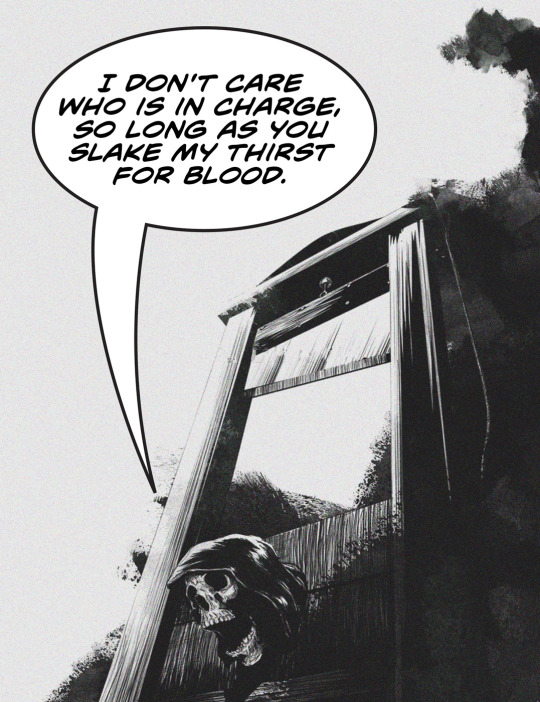
Fetishizing the Violence of the State
It is shocking that even today, radicals would associate themselves with the Jacobins, a tendency that was reactionary by the end of 1793. But the explanation isn’t hard to work out. Then, as now, there are people who want to think of themselves as radical without having to actually make a radical break with the institutions and practices that are familiar to them. “The tradition of all dead generations weighs like a nightmare on the brains of the living,” as Marx said.
If—to use Max Weber’s famous definition—an aspiring government qualifies as representing the state by achieving a monopoly on the legitimate use of physical force within a given territory, then one of the most persuasive ways it can demonstrate its sovereignty is to wield lethal force with impunity. This explains the various reports to the effect that public beheadings were observed as festive or even religious occasions during the French Revolution. Before the Revolution, beheadings were affirmations of the sacred authority of the monarch; during the Revolution, when the representatives of the Republic presided over executions, this confirmed that they held sovereignty—in the name of The People, of course. “Louis must die so that the nation may live,” Robespierre had proclaimed, seeking to sanctify the birth of bourgeois nationalism by literally baptizing it in the blood of the previous social order. Once the Republic was inaugurated on these grounds, it required continuous sacrifices to affirm its authority.
Here we see the essence of the state: it can kill, but it cannot give life. As the concentration of political legitimacy and coercive force, it can do harm, but it cannot establish the kind of positive freedom that individuals experience when they are grounded in mutually supportive communities. It cannot create the kind of solidarity that gives rise to harmony between people. What we use the state to do to others, others can use the state to do to us—as Robespierre experienced—but no one can use the coercive apparatus of the state for the cause of liberation.
For radicals, fetishizing the guillotine is just like fetishizing the state: it means celebrating an instrument of murder that will always be used chiefly against us.
Those who have been stripped of a positive relationship to their own agency often look around for a surrogate to identify with—a leader whose violence can stand in for the revenge they desire as a consequence of their own powerlessness. In the Trump era, we are all well aware of what this looks like among disenfranchised proponents of far-right politics. But there are also people who feel powerless and angry on the left, people who desire revenge, people who want to see the state that has crushed them turned against their enemies.
Reminding “tankies” of the atrocities and betrayals state socialists perpetrated from 1917 on is like calling Trump racist and sexist. Publicizing the fact that Trump is a serial sexual assaulter only made him more popular with his misogynistic base; likewise, the blood-drenched history of authoritarian party socialism can only make it more appealing to those who are chiefly motivated by the desire to identify with something powerful.
-Anarchists in the Trump Era
Now that the Soviet Union has been defunct for almost 30 years—and owing to the difficulty of receiving firsthand perspectives from the exploited Chinese working class—many people in North America experience authoritarian socialism as an entirely abstract concept, as distant from their lived experience as mass executions by guillotine. Desiring not only revenge but also a deus ex machina to rescue them from both the nightmare of capitalism and the responsibility to create an alternative to it themselves, they imagine the authoritarian state as a champion that could fight on their behalf. Recall what George Orwell said of the comfortable British Stalinist writers of the 1930s in his essay “Inside the Whale”:
“To people of that kind such things as purges, secret police, summary executions, imprisonment without trial etc., etc., are too remote to be terrifying. They can swallow totalitarianism because they have no experience of anything except liberalism.”
Punishing the Guilty
“Trust visions that don’t feature buckets of blood.”
-Jenny Holzer
By and large, we tend to be more aware of the wrongs committed against us than we are of the wrongs we commit against others. We are most dangerous when we feel most wronged, because we feel most entitled to pass judgment, to be cruel. The more justified we feel, the more careful we ought to be not to replicate the patterns of the justice industry, the assumptions of the carceral state, the logic of the guillotine. Again, this does not justify inaction; it is simply to say that we must proceed most critically precisely when we feel most righteous, lest we assume the role of our oppressors.
When we see ourselves as fighting against specific human beings rather than social phenomena, it becomes more difficult to recognize the ways that we ourselves participate in those phenomena. We externalize the problem as something outside ourselves, personifying it as an enemy that can be sacrificed to symbolically cleanse ourselves. Yet what we do to the worst of us will eventually be done to the rest of us.
As a symbol of vengeance, the guillotine tempts us to imagine ourselves standing in judgment, anointed with the blood of the wicked. The Christian economics of righteousness and damnation is essential to this tableau. On the contrary, if we use it to symbolize anything, the guillotine should remind us of the danger of becoming what we hate. The best thing would be to be able to fight without hatred, out of an optimistic belief in the tremendous potential of humanity.
Often, all it takes to be able to cease to hate a person is to succeed in making it impossible for him to pose any kind of threat to you. When someone is already in your power, it is contemptible to kill him. This is the crucial moment for any revolution, the moment when the revolutionaries have the opportunity to take gratuitous revenge, to exterminate rather than simply to defeat. If they do not pass this test, their victory will be more ignominious than any failure.
The worst punishment anyone could inflict on those who govern and police us today would be to compel them to live in a society in which everything they’ve done is regarded as embarrassing—for them to have to sit in assemblies in which no one listens to them, to go on living among us without any special privileges in full awareness of the harm they have done. If we fantasize about anything, let us fantasize about making our movements so strong that we will hardly have to kill anyone to overthrow the state and abolish capitalism. This is more becoming of our dignity as partisans of liberation.
It is possible to be committed to revolutionary struggle by all means necessary without holding life cheap. It is possible to eschew the sanctimonious moralism of pacifism without thereby developing a cynical lust for blood. We need to develop the ability to wield force without ever mistaking power over others for our true objective, which is to collectively create the conditions for the freedom of all.
“That humanity might be redeemed from revenge: that is for me the bridge to the highest hope and a rainbow after lashing storms.”
-Friedrich Nietzsche (not himself a partisan of liberation, but one of the foremost theorists of the hazards of vengefulness)
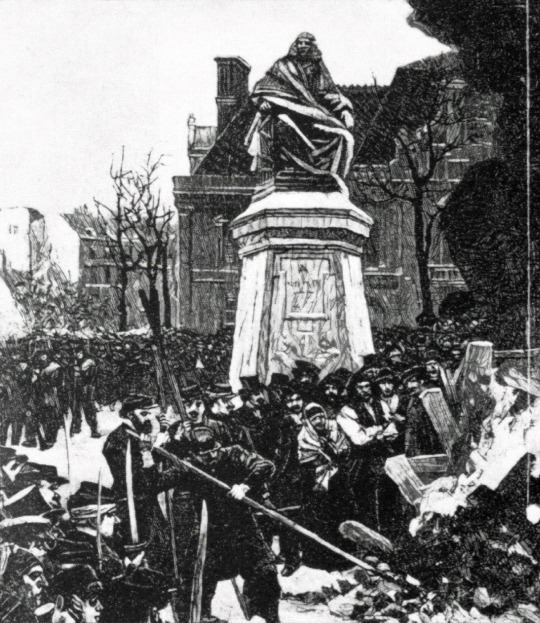
Communards burning the guillotine as a “servile instrument of monarchist domination” at the foot of the statue of Voltaire in Paris on April 6, 1871.
Instead of the Guillotine
Of course, it’s pointless to appeal to the better nature of our oppressors until we have succeeded in making it impossible for them to benefit from oppressing us. The question is how to accomplish that.
Apologists for the Jacobins will protest that, under the circumstances, at least some bloodletting was necessary to advance the revolutionary cause. Practically all of the revolutionary massacres in history have been justified on the grounds of necessity—that’s how people always justify massacres. Even if some bloodletting were necessary, that it is still no excuse to cultivate bloodlust and entitlement as revolutionary values. If we wish to wield coercive force responsibly when there is no other choice, we should cultivate a distaste for it.
Have mass killings ever helped us advance our cause? Certainly, reactionaries throughout history have disingenuously held revolutionaries to a double standard, forgiving the state for murdering civilians by the million while taking insurgents to task for so much as breaking a window. But as we seek transformation rather than conquest, we should appraise our victories according to a different logic than the police and militaries we confront.
This is not an argument against the use of force. Rather, it is a question about how to employ it without creating new hierarchies, new forms of systematic oppression.
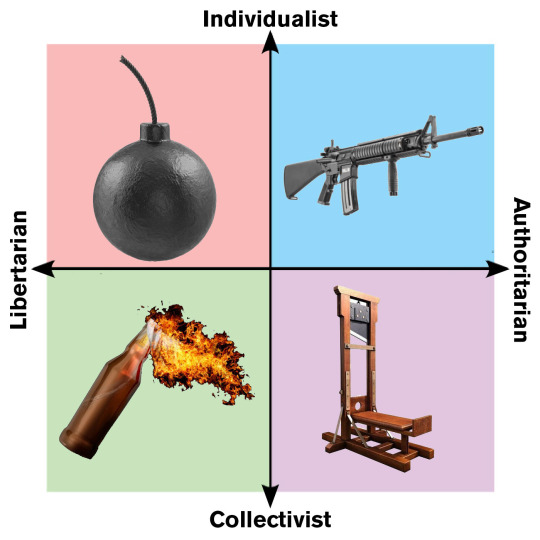
A taxonomy of revolutionary violence.
The image of the guillotine is propaganda for the kind of authoritarian organization that can avail itself of that particular tool. Every tool implies the forms of social organization that are necessary to employ it. In his memoir, Bash the Rich, Class War veteran Ian Bone quotes Angry Brigade member John Barker to the effect that “petrol bombs are far more democratic than dynamite,” suggesting that we should analyze every tool of resistance in terms of how it structures power. Critiquing the armed struggle model adopted by hierarchical authoritarian groups in Italy in the 1970s, Alfredo Bonanno and other insurrectionists emphasized that liberation could only be achieved via horizontal, decentralized, and participatory methods of resistance.
“It is impossible to make the revolution with the guillotine alone. Revenge is the antechamber of power. Anyone who wants to avenge themselves requires a leader. A leader to take them to victory and restore wounded justice.”
-Alfredo Bonanno, Armed Joy
Together, a rioting crowd can defend an autonomous zone or exert pressure on authorities without need of hierarchical centralized leadership. Where this becomes impossible—when society has broken up into two distinct sides that are fully prepared to slaughter each other via military means—one may no longer speak of revolution, but only of war. The premise of revolution is that subversion can spread across the lines of enmity, destabilizing fixed positions, undermining the allegiances and assumptions that underpin authority. We should never hurry to make the transition from revolutionary ferment to warfare. Doing so usually forecloses possibilities rather than expanding them.
As a tool, the guillotine takes for granted that it is impossible to transform one’s relations with the enemy, only to abolish them. What’s more, the guillotine assumes that the victim is already completely within the power of the people who employ it. By contrast with the feats of collective courage we have seen people achieve against tremendous odds in popular uprisings, the guillotine is a weapon for cowards.
By refusing to slaughter our enemies wholesale, we hold open the possibility that they might one day join us in our project of transforming the world. Self-defense is necessary, but wherever we can, we should take the risk of leaving our adversaries alive. Not doing so guarantees that we will be no better than the worst of them. From a military perspective, this is a handicap; but if we truly aspire to revolution, it is the only way.
Liberate, not Exterminate
“To give hope to the many oppressed and fear to the few oppressors, that is our business; if we do the first and give hope to the many, the few must be frightened by their hope. Otherwise, we do not want to frighten them; it is not revenge we want for poor people, but happiness; indeed, what revenge can be taken for all the thousands of years of the sufferings of the poor?”
-William Morris, “How We Live and How We Might Live”
So we repudiate the logic of the guillotine. We don’t want to exterminate our enemies. We don’t think the way to create harmony is to subtract everyone who does not share our ideology from the world. Our vision is a world in which many worlds fit, as Subcomandante Marcos put it—a world in which the only thing that is impossible is to dominate and oppress.
Anarchism is a proposal for everyone regarding how we might go about improving our lives—workers and unemployed people, people of all ethnicities and genders and nationalities or lack thereof, paupers and billionaires alike. The anarchist proposal is not in the interests of one currently existing group against another: it is not a way to enrich the poor at the expense of the rich, or to empower one ethnicity, nationality, or religion at others’ expense. That entire way of thinking is part of what we are trying to escape. All of the “interests” that supposedly characterize different categories of people are products of the prevailing order and must be transformed along with it, not preserved or pandered to.
From our perspective, even the topmost positions of wealth and power that are available in the existing order are worthless. Nothing that capitalism and the state have to offer are of any value to us. We propose anarchist revolution on the grounds that it could finally fulfill longings that the prevailing social order will never satisfy: the desire to be able to provide for oneself and one’s loved ones without doing so at anyone else’s expense, the wish to be valued for one’s creativity and character rather than for how much profit one can generate, the longing to structure one’s life around what is profoundly joyous rather than according to the imperatives of competition.
We propose that everyone now living could get along—if not well, then at least better—if we were not forced to compete for power and resources in the zero-sum games of politics and economics.
Leave it to anti-Semites and other bigots to describe the enemy as a type of people, to personify everything they fear as the Other. Our adversary is not a kind of human being, but the form of social relations that imposes antagonism between people as the fundamental model for politics and economics. Abolishing the ruling class does not mean guillotining everyone who currently owns a yacht or penthouse; it means making it impossible for anyone to systematically wield coercive power over anyone else. As soon as that is impossible, no yacht or penthouse will sit empty long.
As for our immediate adversaries—the specific human beings who are determined to maintain the prevailing order at all costs—we aspire to fight against them without seeking to exterminate them. However selfish and rapacious they appear, at least some of their values are similar to ours, and most of their errors—like our own—arise from their fears and weaknesses. In many cases, they oppose our proposals precisely because of what is internally inconsistent in them—for example, the idea of bringing about the fellowship of humanity by means of violent coercion. Were it not for the genuinely egregious things that have been done in the name of liberation, our enemies would have much weaker arguments against it.
Even when we are engaged in pitched physical struggles with our adversaries, we ought to maintain a profound faith in their potential, for we hope to live in different relations with them one day. As aspiring revolutionaries, this hope is our most precious resource, the foundation of everything we do. If revolutionary transformation is to spread throughout society and across the world, those we fight today will have to be fighting alongside us tomorrow. We do not preach conversion by the sword, nor do we imagine that we will persuade our adversaries in some abstract marketplace of ideas; rather, we aim to interrupt the ways that capitalism and the state currently reproduce themselves while demonstrating the virtues of our alternative inclusively and contagiously. There are no shortcuts when it comes to revolution.
Precisely because it is sometimes necessary to employ force in our conflicts with those who preserve the prevailing order, it is especially important that we never lose sight of our aspirations, our compassion, and our optimism. When we are compelled to use coercive force in the struggle, the only possible justification for doing so is that it is a necessary step towards creating a better world for everyone—including our enemies, or at least their children. Otherwise, we risk becoming the next ones to operate the guillotine.
“The only real revenge we could possibly have would be by our own efforts to bring ourselves to happiness.”
-William Morris, in response to calls for revenge for police attacks on demonstrations in Trafalgar Square
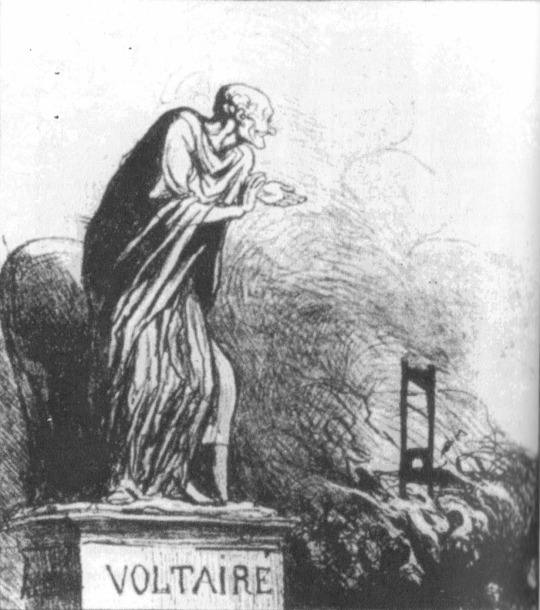
Voltaire applauding the burning the guillotine during the Paris Commune.
Appendix: The Beheaded
The guillotine did not end its career with the conclusion of the first French Revolution, nor when it was burned during the Paris Commune. In fact, it was used in France as a means for the state to carry out capital punishment right up to 1977. One of the last women guillotined in France was executed for providing abortions. The Nazis guillotined about 16,500 people between 1933 and 1945—the same number of people killed during the peak of the Terror in France.
A few victims of the guillotine:
Ravachol (born François Claudius Koenigstein), anarchist
Auguste Vaillant, anarchist
Emile Henry, anarchist
Sante Geronimo Caserio, anarchist
Raymond Caillemin, Étienne Monier and André Soudy, all anarchist participants in the so-called Bonnot Gang
Mécislas Charrier, anarchist
Felice Orsini, who attempted to assassinate Napoleon III
Hans and Sophie Scholl and Christoph Probst—members of Die Weisse Rose, an underground anti-Nazi youth organization active in Munich 1942-1943.
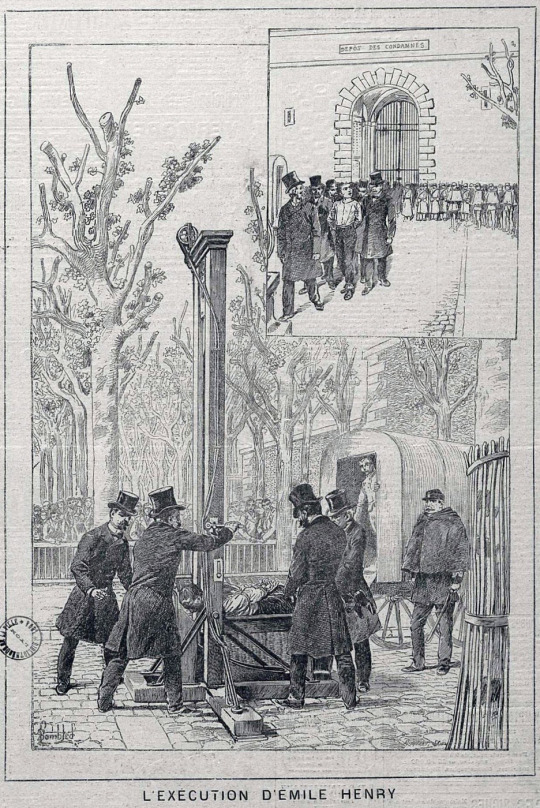
Emile Henry.
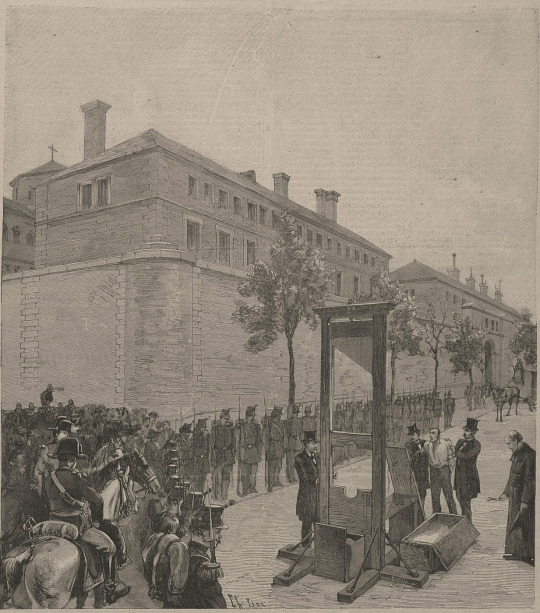
Sante Geronimo Caserio.
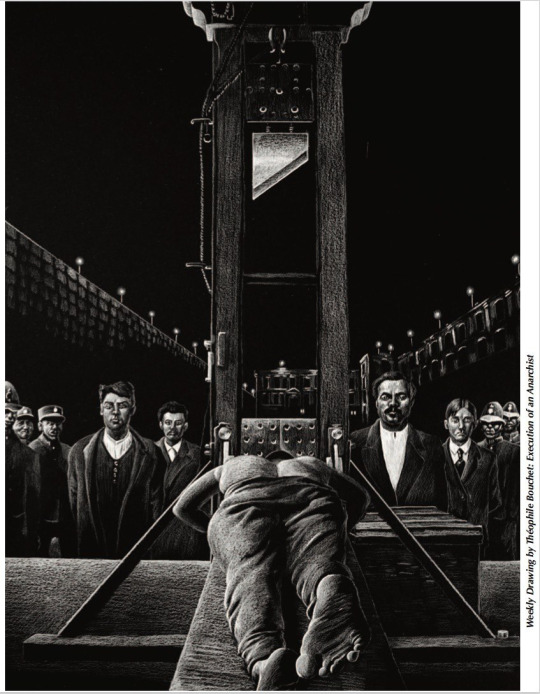
André Soudy, Edouard Carouy, Octave Garnier, Etienne Monier.

Hans and Sophie Scholl and Christoph Probst.
“I am an anarchist. We have been hanged in Chicago, electrocuted in New York, guillotined in Paris and strangled in Italy, and I will go with my comrades. I am opposed to your Government and to your authority. Down with them. Do your worst. Long live Anarchy.”
-Chummy Fleming
Further Reading
The Guillotine At Work, GP Maximoff
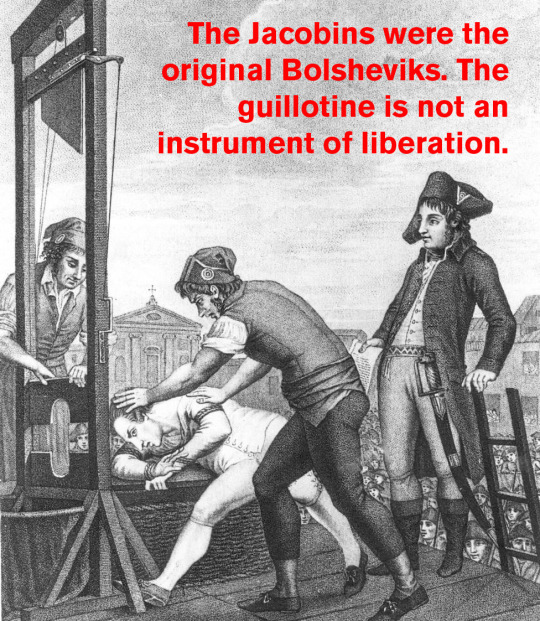
As reported in the official journal of the Paris Commune:
“On Thursday, at nine o’clock in the morning, the 137th battalion, belonging to the eleventh arrondissement, went to Rue Folie-Mericourt; they requisitioned and took the guillotine, broke the hideous machine into pieces, and burned it to the applause of an immense crowd.
“They burned it at the foot of the statue of the defender of Sirven and Calas, the apostle of humanity, the precursor of the French Revolution, at the foot of the statue of Voltaire.”
This had been announced earlier in the following proclamation:
“Citizens,
“We have been informed of the construction of a new type of guillotine that was commissioned by the odious government [i.e., the conservative Republican government under Adolphe Thiers]—one that it is easier to transport and speedier. The Sub-Committee of the 11th Arrondissement has ordered the seizure of these servile instruments of monarchist domination and has voted that they be destroyed once and forever. They will therefore be burned at 10 o’clock on April 6, 1871, on the Place de la Mairies, for the purification of the Arrondissement and the consecration of our new freedom.” ↩
As we have argued elsewhere, fetishizing “the rule of law” often serves to legitimize atrocities that would otherwise be perceived as ghastly and unjust. History shows again and again how centralized government can perpetrate violence on a much greater scale than anything that arises in “unorganized chaos.” ↩
Nauseatingly, at least one contributor to Jacobin magazine has even attempted to rehabilitate this precursor to the worst excesses of Stalinism, pretending that a state-mandated religion could be preferable to authoritarian atheism. The alternative to both authoritarian religions and authoritarian ideologies that promote Islamophobia and the like is not for an authoritarian state to impose a religion of its own, but to build grassroots solidarity across political and religious lines in defense of freedom of conscience. ↩
51 notes
·
View notes
Text
first of all, i want to clarify that this is not a callout post. it’s more of a personal catharsis thing — i don’t really have any ‘receipts’, though i do have numerous other witnesses and victims. ive been intentionally vague about this for about 5 years now, trying to keep the peace and avoid any unnecessary drama.
the story i originally gave when miranda and i parted ways was that we were simply incompatible; i implied that we were both good people who ultimately brought out the worst in each other. that is partially true — we were incompatible, and we did bring out the worst in each other. however, there’s a bit more to it than that.
i met miranda through the tumblr rpc in the early days of this particular blog. i was a young teenager. miranda was older than me, though also a teenager at the time; either a junior or senior in high school. she seemed sweet at the time, though shy and insecure. she also seemed sad a lot. we bonded over a love of the film moulin rouge and writing dark subject matter. we had our characters interact, and she quickly grew attached to both zero and i.
she quickly began to exibhit strange behavior. she would pressure me to do plots i wasn’t keen on and get extremely upset if i was hesitant. she was fiercely jealous and she would use her character, abra, to vent her personal grudges and vendettas against other writers and characters i interacted with. she accused a great deal of people in our circles of plagiarism (admittedly, there were a few cases of her suspicions proving to be true) and would bully them relentlessly, sometimes to the point of chasing them off the platform. she decided she didn’t like people seemingly at random and became hostile if i continued to speak to them.
she began to refer to me as her best friend within a few months of our knowing each other. i was not comfortable with this. i didn’t think i wanted to get very close to her, even if i had fun writing with her. however, she persisted relentlessly and pressured me into saying it back, and eventually i trained myself into believing it was true.
she forced the zero and abra ship. that may come as a surprise to people who knew us back then. i didn’t want to do it, but she would have a full-blown breakdown any time i said i didn’t see the two characters ending up together — so eventually i caved and engaged fully. this was another thing i had to learn to enjoy.
any time i made a decision for myself, she would be unhappy with me. this started out as rp- and character-based decisions only, but soon upgraded to any decision regarding real life as well. she didn’t like it when i came up with my own plot ideas and would fight with me. she didn’t like it if i talked to other writers, save for the few she deemed acceptable (until she inevitably had a falling out with them and i was not allowed to speak to them anymore). she didn’t like it if i wasn’t accessable 24/7. she became hostile if she found out i had plans or was not at my computer. she would become irritated if i talked about people in my life that she didn’t already know.
eventually, it got to the point where i rarely ever left my house, afraid of the reaction i would get. due to my mental health, i began to do homeschooling in the middle of my teen years (this was not related to her), which gave her unreserved access to me. i ended up losing contact with more than half my real-life friends. this lasted about 3 or 4 years — most of my formative teen years.
where i wasn’t allowed to have other friends, engage with other writers, have other ships, leave my house, or generally have any life experience, she was. if i brought up this contradiction i would be shamed and berated for being a bad friend. if i was worried about any of the decisions she was making — self-destructive habits, engaging with dangerous people in her real life, handling her money recklessly — i would be even further shamed. she kept me from her other friends, refusing to let me speak to any of them. she publicly played up her popularity with these friends, as well as her “fans” on her personal blog, while rarely ever mentioning me. if she wanted to prove a point, she would ignore me entirely to keep me in my place while championing and publicly lauding these other people. of course, if i spoke to almost anyone other than my few rp friends (which, again, were mostly selected by her whims), there would be absolute hell to pay.
she was fairly popular on her personal blog, and became regarded as an authority and critic on social issues. a great deal of her “hot takes” were extremely damaging, or not thoroughly researched. half the time she did not know what she was talking about. if anyone disagreed with her on anything — even mundane, small things that had nothing to do with social issues — they were deemed either racist or misogynistic or both. (miranda is a latinx woman, so she has had to deal with institutional racism. i want to make it clear she wasn’t a white girl crying racism — all of this is bad enough without misleading claims.) if she were informed she could not be an authority on the plight of demographics she did not fit into, she would throw a fit and talk in circles until she came up with something to make the other person, sometimes a member of the demographic she was representing falsely, appear in the wrong.
she had a great deal of internalized homophobia that offended me (i’m bisexual), and when i called her out on it, she grew highly emotional and guilted me relentlessly. i never brought it up again. after we parted ways, she came out as a lesbian. this was after years of her throwing a fit if i so much as said i’d kiss her in a playful context — though she sexted me once. she became distressed or annoyed if i ever mentioned it, which left me feeling rather dirty and used, especially since i was 17.
the body positively movement was gaining traction around this time, so she latched onto that, “reclaiming thickness”. the problem with that is that she was rather thin with slight curves. i, however, am heavyset — and was made to feel ugly by her for it while she also talked over me about thickness, fatphobia, and body shaming to further her own personal agenda.
i underwent extreme personality changes with miranda controlling my life. i was an outgoing and confident teenager, if not a bit obnoxious, before i met her; now, to this day, i am rather reserved and shy. i have trouble befriending people. certain typing patterns make me anxious (miranda had a distinct textual tone when she was upset). my self esteem isn’t what it used to be. i have to triple check my own perceptions of things — even now, writing this, i have to wonder if everything really happened the way i remember it, or if i am just melodramatic and oversensitive.
i have countless horror stories, fragmented anecdotes. examples of her behavior.
she once claimed to have taken a bunch of pills in a suicide attempt, then immediately backtracked when i, worried sick, was preparing to call someone, saying that she threw them all up and was fine. she went to bed immediately after, making it clear she was irritated at me for responding to what i can only assume now were theatrics.
when the older boy i thought i was in love with molested me, and i — young, confused, and upset, with only a few hours having passed — considered speaking to him again, she berated me and threatened to cut all contact, saying that she “didn’t think she could be friends with someone who would do that”. (she also berated me when i expressed concern that she was still in contact with someone who abused her.)
a few months after my brother, who i loved more than anyone in the world, died unexpectedly, she expressed the news had upset her because she “knew it would change things between us” — in her mind, my grief took a backseat to the inconvenience of my attention being elsewhere.
when one of my friends expressed interest in one of my characters she was especially attached to, she came at me in violent hysterics, saying “HE’S MINE”, as though he were a real person. this fight escalated to literal life threatening perportions when my friend became hospitalized, the violent bullying and gaslighting from miranda being a factor.
when i began to hang out with my real life friends again once a week after years of isolation, she claimed that i didn’t care about our relationship and that we weren’t “working out”, and she may not want to be friends with me anymore.
i have a lot more, but i think we’ve gone dark enough for now.
i also want to bring up the way i behaved. the relationship did bring out the worst in me. i began to think like her in a lot of ways. there were times when i was cruel and manipulative and selfish. there were times when i was mean to other people. there were times when i would react to something in a melodramatic, irrational way when it didn’t have to be that way. i think that i became a really bad person for a while. there are still some habits that i’m trying to unlearn — like not saying what i mean and then getting upset with people for not knowing anyway, or being harshly critical and judgmental of those undeserving, or seeking out affection through ridiculously convoluted ways. i’m working on it. (honestly, i’m deathly afraid of turning into her.) a lot of it has been worked out of my system after five years, but there are relapses from time to time.
when i began to tell one of my friends about what i was experiencing, i slowly came to realize it wasn’t normal. i came to terms that it was abusive. eventually, i reached a point where i felt brave enough to disconnect. i told her that i couldn’t do it anymore, and then said goodbye. she tried every trick in the book into getting me to stay, but i managed.
i will still get the occasional message from her every six or so months that proves she hasn’t changed and has no intention of changing. the messages range from hostile to desperate to sad and asking for forgiveness.
based on what ive heard from other people, she’s only gotten worse.
there are currently 6 other people i can think of off the top of my head who also had traumatic experiences with miranda. and that’s just the few i know of.
so, there you go — that person i wrote with for years and years and seemed so happy with was basically keeping me hostage. i know that may come as a shock to some, and not to others. i hope anyone else who has been hurt by her is also brought some relief by the truth finally coming out: no, you weren’t crazy!
if anyone else would like to come forward, too, i’m always listening. it may help to talk about it.
#i'm not doing any formatting on this post because it feels needlessly vain to worry about aesthetics when this is kinda serious#anyway give this a read#if you want to reblog it that's okay too#it felt very cathartic to write this out! but also stressful#☆ offscreen .
31 notes
·
View notes
Text
samwpmarleau
replied to your post
“Don't you think POD was a bit abelist for refusing tyrion?”
see, idk, while that may be par for the course in westeros, it's pretty dang hypocritical. elia wasn't supposed to survive infancy either, and yet she did. oberyn is the one putting the ableism spin on his mother's choices, we have nothing from her specifically. imo, she easily could have taken it as an insult for a) ableism towards her own daughter, b) the reneging on the deal she had with joanna, which tywin presumably used to be on board with, c) the assertion that elia isn't ~worthy~ of his precious jaime, and d) because betrothing elia to tyrion would mean at EARLIEST elia couldn't have her first kid until she was 29, which is just ridiculous in westeros' terms.
It’s true that we haven’t heard from the Princess of Dorne herself but Oberyn is as close to a reliable witness as we’re going to get until GRRM deigns to give her a voice. By no means does that mean that everything he says must be accurate, but the flow of the conversation between him and Tyrion doesn’t seems to support that this is only Oberyn’s spin imo. Oberyn alternates between telling his mother’s observations and giving his own conclusions in this conversation but he does frame each as they are. For example, he clearly presents his thoughts about the supposed double betrothals and the cabin on their ships as his own deduction before he shifts into telling information that his mother told him. The part about the match with Tyrion being taken as an outrage not only comes with Oberyn’s assertion that it was, it comes in-between an instance where Oberyn is recounting things his mother told him, and another where he confirms that she did think that she won the tilt. The context that Oberyn gives - that this is a story that merited a mention on the Princess’s deathbed, no less than 6 years after the incident and (probably) after Elia had married Rhaegar - coupled by his lack of objection to Tyrion’s assumption that the Princess did think of the offer as an outrage makes me inclined to take this as the Princess’s take too and not just Oberyn’s. After all, if she didn’t take it as an insult, why did she think that she won the tilt like Oberyn confirms? Yes, it’s absolutely because wedding Elia to Rhaegar was a resounding rebuff to the ableism Tywin showed towards Elia, but that is intrinsically tied to Tyrion and his disability.
Thing is, the ableism against Elia can not be separated from the ableism against Tyrion because it was delivered through Tyrion. The very expression of Tywin’s ableism towards Elia was in offering disabled Tyrion instead of able-bodied Jaime, sending a message that sickly Elia could only be worthy for the disabled kid, not the golden able-bodied one. If Tyrion was not disabled, if there was no ableism leveled at him from both parties, the offer wouldn’t have been an insult in the first place. We can’t claim that the Princess of Dorne was insulted only because the offer of Tyrion displayed ableism towards Elia which had nothing to do with Tyrion himself when said ableism lies in offering Tyrion. If she didn’t think there was something wrong with Tyrion, then what was the insult to Elia? That Tyrion was much younger? That might have made the match a bad fit, disadvantageous and unsuitable for the Princess’ dynastic hopes, but it’s no insult in and of itself. Not “an outrage” as Tyrion put it and Oberyn agreed with him. Simply a part of dynastic negotiation.
Nor can the fact that Tywim refused the match be taken as an insult on its own, unless every other lord took failed marital plans as a personal insult, and unless the Princess of Dorne herself took Tywin’s rejection of Oberyn for Cersei as an insult. Which she didn’t though Tywin’s brusque tone clearly bothered her. Too, it can not be said that Tywin reneged on a previous marital agreement because we got no indication that Tywin even knew about the correspondence between the Princess and Joanna, and Joanna’s own agreement can not be seen as a solid promise of betrothal that Tywin should be held to because marriages are typically arranged and negotiated between heads of Houses so Joanna couldn’t have formally betrothed the twins without Tywin’s approval. As a political actor in her own right, the Princess knew that, which is further supported by how all the information we have indicates that she didn’t approach the matter like it was previously preliminary approved. I’d also think that the Princess would have mentioned it to Oberyn if this was a case of Tywin going back on his word, considering that betrothal agreements are a big deal in Westeros.
while ableism is rampant, given elia's own condition, the fact that dorne is more lenient with pretty much everything, and tywin's betrayal, i think it just as likely she took it as just a plain insult, irrespective of tyrion's condition.
I don’t think that Elia’s illness precludes the Princess of Dorne displaying ableist behavior. It is not uncommon for someone to display prejudice against the same minority group that a loved one belongs to. This is a bit like saying that someone isn’t racist because they have PoC in their family. Not only does casual prejudice exist in behavior that isn’t consciously recognized as prejudice, but selectivity in prejudice also exists. It is not uncommon for someone to exclude a loved one from a certain prejudice. We see this all the time in real life and also repeatedly in the text. Various Starks causally dehumanize Tyrion by referring to him by a slur or reducing him to his disability, but they’d never do that to Bran (though casual ableism towards Bran does creep up in several places because they don’t even realize that’s ableism). Tywin is a ramping misogynist who thinks women are inherently inferior and has wild issues with powerful women but Joanna was still his confidante who he left in charge when he was absent. Rhaenyra Targaryen displayed the usual prejudice and scapegoating of bastards when she ordered the arrest of Addam Velaryon based on nothing but his bastardy, even though her fiercely protected elder three sons were all bastards. Lysa Tully is grossly ableist towards Tyrion, even though her own beloved child is also a victim of Westerosi ableism. Oberyn himself showed ableist behavior towards Tyrion in a way I highly doubt he showed with either of his beloved siblings.
(I also think there is a conversation to be had about the kind of disability in question because that does affect the form of ableism leveled at a disabled person. Ableism aimed at Tyrion is different from the one aimed at Elia is different from the one aimed at Lollys is different from the one aimed at Hodor, even though all have points of correlation and all share the implicit belief that the disabled person is worth less than others. That casual assumption of Tyrion’s immorality and evilness and violence even as a baby or before he’d done anything questionable that’s from people who aren’t as grossly ableist as the Lannisters, that’s a distinct pattern of disturbingly common reactions to Tyrion that is patterned to his specific disability. But I’m not really equipped to tackle this subject so I’ll leave to more informed people).
additionally, the fact that elia was besotted with baby tyrion and thought him absolutely adorable, and that oberyn thought him a perfectly normal (or at least not deformed "enough") baby suggests the POD didn't display much ableism at all in raising them. maybe they just turned out well in spite of her, but i'm not inclined to think that the case.
That’s a too narrow view of what ableism is, though. It restricts ableism to the purposely malicious and more extreme form, to instances where people call a disabled baby monstrous because of his disability or use it as an excuse to abuse him. But that is not the only form of ableism there is. Casual ableism is still ableism.
More importantly, it is not accurate to imply the Martells haven’t shown ableism and use it as a proof that the Princess didn’t display it in turn. Because Oberyn was repeatedly ableist. He might have thought Tyrion “a poor sort of monster”, but he said baby Tyrion had “an evil eye” (evil being a stereotype often used against Tyrion due to his dwarfism which automatically vilifies him in the eyes of everyone), regularly referred to him as the Imp, told him to his face that it was an outrage that he was put forward as an option for his sister and expected Tyrion to see where he was coming from. Oberyn displayed a lot of casual ableism with Tyrion, because ableism is inescapable in their society. I tend to think about the instance with the Princess of Dorne as a similar kind of casual ableism. I reiterate that I don’t think the Princess of Dorne was malicious or that she wanted to tear Tyrion down. But I do think that she thought him not good enough for her daughter because of his disability, in a similar way to Catelyn’s reaction to his marriage to Sansa (though that has other elements as well, of course. But thinking of Tyrion as “the twisted little man” really can’t be taken as anything but ableism).
Point is, one doesn’t need to be actively abusive or terrible to be ableist. Jon Snow actively lorded his physicality over Tyrion at the beginning. Some of the kindest souls in the series like Sansa and Bran still display that prejudice, not out of maliciousness or a desire to hurt and not out of a conscious belief of superiority to the disabled person. It doesn’t mean they are bad people. But that doesn’t make their behavior any less ableist, not when it’s built on, informed by and expressed through a person’s disability.
#asoiaf#asoiaf meta#tyrion lannister#elia martell#the unnamed princess of dorne#oberyn martell#tywin lannister#bran stark#lollys stokeworth#hodor#disability in westeros#ableism tw#ableism in westeros
27 notes
·
View notes